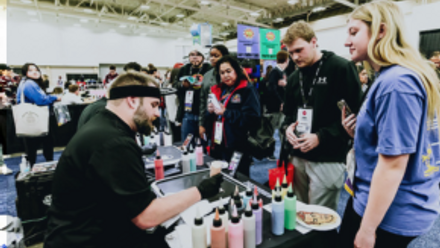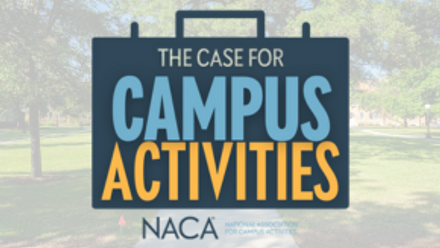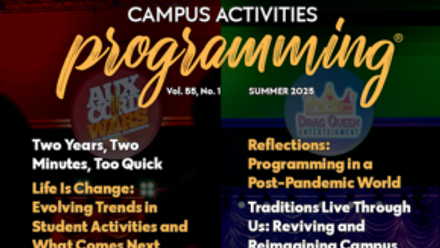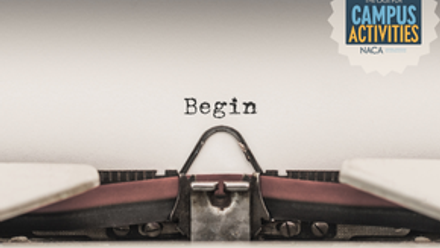Bringing NACA’s Case for Campus Activities to the University of Colorado Denver
At the University of Colorado Denver (CU Denver), we recognize that Campus Activities do more than fill a calendar; they help students find a sense of belonging, develop leadership skills, support their mental health, and prepare for life beyond graduation. That’s why the Office of Student Life & Campus Community is proud to be using NACA’s Making the Case for Campus Activities (the Case) as a guiding framework for how we advocate, plan, and communicate the value of our work.
At CU Denver, we’re using this evidence-based model to drive change and make the case for why student life matters more than ever.
How We’re Using the Case at CU Denver
Framing Strategic Planning and Priorities:
We’re embedding the Case into our strategic planning for Student Life. Whether we’re proposing new initiatives, evaluating existing programs, or aligning with university goals, we will use the Case to assess current initiatives and inform the development of future programs that better serve our diverse student body. For example, when reviewing student organization development or new event ideas, we ask: How does this support a sense of belonging or prepare students for life after graduation?
It’s become more than a reference; it’s a foundation for decision-making and goal-setting in Student Life.
Strengthening Campus Advocacy
Let’s be honest, budgets are tight. That’s why we’re using the Case to make a data-backed argument to senior leadership about why investing in campus activities is not a “nice to have,” it’s a must-have. From staffing requests to space management to student fee proposals, the Case provides a compelling narrative that connects the student co-curricular experience to institutional priorities, such as retention, student success, and campus climate.
It helps us move from “here’s what we do” to “here’s the research-backed impact we have.”
Training Our Staff and Student Leaders
We’re developing training materials that help our professional staff and student leaders articulate how their work contributes to the broader student experience. This shared language and understanding help unify our team and empower student leaders to speak confidently to stakeholders about the impact of their events, programs, and initiatives.
Reframing the Narrative of Campus Activities
We’re shifting from saying “we do a lot of events” to “we build belonging, develop future leaders, and support student success.” Using the Case, we are reframing how we discuss our work, not just to students, but also to faculty, administrators, parents, and community partners. Instead of positioning events as just fun or extra, we’re showing how they’re part of the student success pipeline. Our storytelling has evolved, highlighting themes like mental health support, identity development, and leadership training.
This shift is making it easier for stakeholders outside of Student Life to see our value and partner with us.
Tips for Other Schools: How to Use the Case on Your Campus
If your campus isn’t using the Case yet or if you’re not sure how to get started, here are a few ways to activate it and spark conversation:
- Host a Campus Conversation - Organize a brown bag lunch, department meeting, or divisional town hall to introduce the Case. Share real examples of how your programs align with the outcomes in the report. Invite academic and administrative partners to join the conversation and help bridge silos.
- Embed It in Assessment - Use the Case to guide your program evaluations. Instead of only counting attendance, assess how your programs impact student learning, sense of belonging, or overall well-being. Did the event support student well-being? Did it create a sense of belonging? This can enhance the credibility of your work and enable you to make data-informed improvements.
- Use It in Budget Narratives and Proposals - Don’t just list what your office does, explain why it matters using language from the Case. Whether you're presenting to student fee boards, senior leadership, or external partners, tying your work to national research makes your proposals more compelling.
- Train Your Student Leaders - Make the Case part of your leadership retreats or student org training. When students understand how their involvement supports career readiness or campus climate, they become more effective advocates and intentional leaders.
- Build a Cross-Functional Task Force - Bring together colleagues from across campus, student affairs, academic affairs, institutional research, DEI, and career services to explore how you can collectively use the Case to enhance student success. Many of the outcomes they’re working toward overlap with student activities, which gives you common ground to collaborate and co-sponsor efforts.
Why This Matters Now
The higher education landscape is changing rapidly. Students are questioning the value of college, campuses are navigating tight budgets, and many institutions are reevaluating their priorities. The Case presents a timely, research-backed roadmap that demonstrates student life isn’t just about events, it’s about student success.
At CU Denver, we’re committed to ensuring that student activities are not just seen as fun, but also as foundational. By using the Case as a cornerstone of our advocacy and operations, we’re telling a new story about what student life can be: intentional, impactful, and indispensable.
Final Thoughts
We encourage schools across the country to adopt and adapt the Case in ways that reflect your mission, your students, and your campus climate. Whether you use it to shape strategy, advocate for funding, or empower your students, it’s a tool that can help you tell a stronger story.
If you’re looking to bring the Case to life at your institution, start small, build buy-in, and connect it to your campus priorities. At CU Denver, it’s already helping us advocate smarter, plan better, and create a more intentional student life experience.
Let’s make the case together.
Explore NACA’s Case for Campus Activities at www.campusactivities.org.
Want to learn more about how CU Denver is using the Case? Reach out to [email protected].






